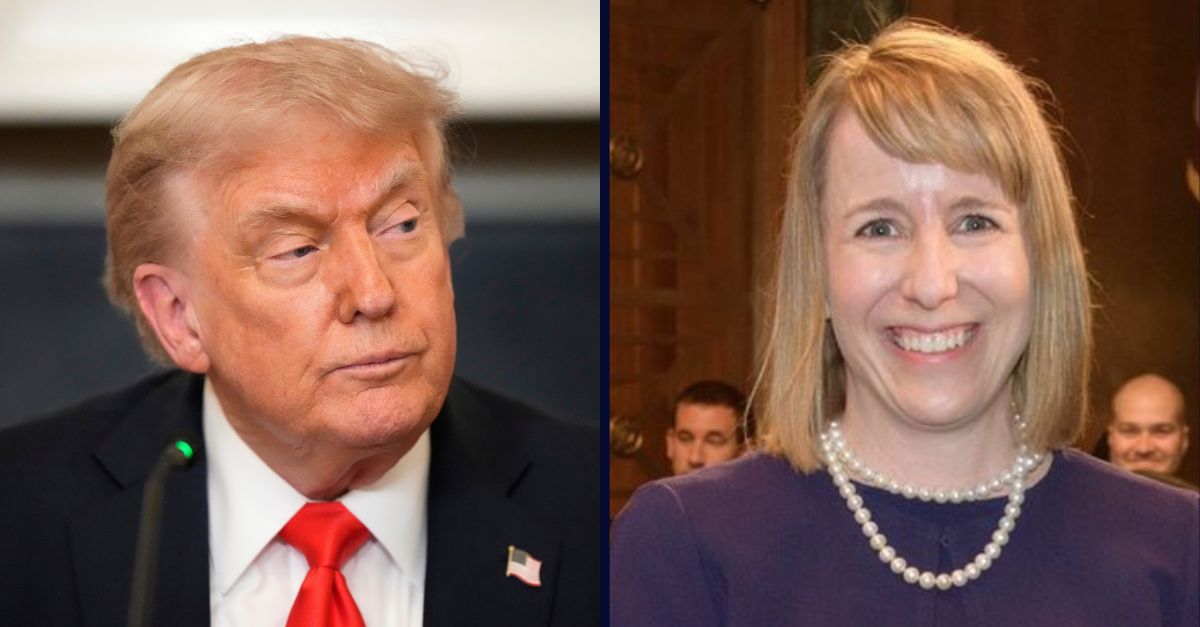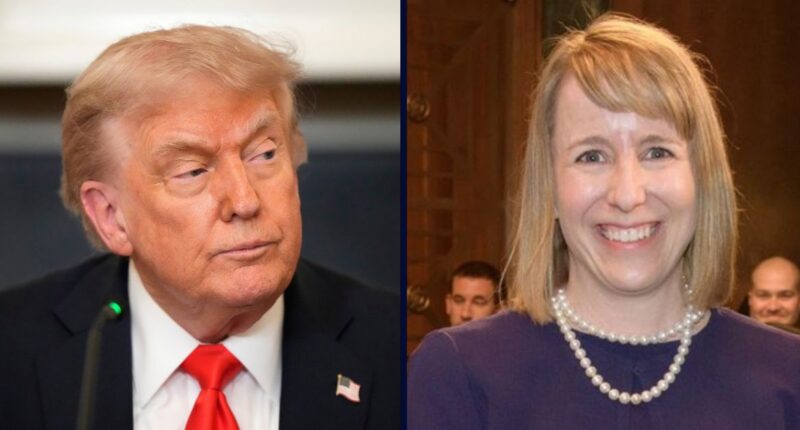
Left: President Donald Trump is seen attending a meeting with the Fraternal Order of Police in the State Dining Room of the White House, Thursday, June 5, 2025, in Washington (AP Photo/Alex Brandon). Right: U.S. District of Maryland Judge Stephanie Gallagher is pictured during a nomination hearing in April 2016 (Facebook page of then-Sen. Barbara Ann Mikulski, D-Md.)
A federal judge has established a clear schedule for the Trump administration to provide regular updates on the situation of a man who was deported “unjustly” and is now seeking to return to the United States.
U.S. District Judge Stephanie Gallagher from the District of Maryland has instructed the administration to offer progress reports on a weekly basis concerning a man known by the alias “Christian” and currently imprisoned in El Salvador. The judge’s order compels federal officials to demonstrate genuine efforts or risk facing penalties.
“Beginning on Friday, June 6, 2025, and continuing each Friday thereafter until further order of this Court, Defendants should file a weekly status report on or before noon ET in the form of a declaration by an individual with personal knowledge,” Gallagher wrote in an order concerning “Christian” — who has been identified by Politico as Daniel Lozano-Camargo, a 20-year-old Venezuelan man who was living in Maryland before he was deported to El Salvador.
In May, Gallagher ruled that Lozano-Camargo was “wrongfully” deported in violation of a legal settlement agreement meant to keep him in the U.S. while his pending asylum claim was litigated with U.S. Citizenship and Immigration Services (USCIS).
Now, a month later, the judge is demanding updates, with each ordered status report needing to contain the following: Lozano-Camargo’s physical location and who is supervising him, what steps have been taken to “facilitate” his return, and what the plan is to further do so. She has allowed the man’s attorneys to request discovery within a week, although she has limited the number and types of requests Lozano-Camargo’s lawyers may submit. She also addressed the case of Kilmar Abrego Garcia, another man who was living in Maryland before being deported to El Salvador — an action the Trump administration admitted was a mistake.
“Any requests concerning discovery produced in Abrego Garcia v. Noem … must be narrowly tailored to focus on any agreement, arrangement, or understanding between the United States and El Salvador that also implicates or affects the removal, confinement, or return of Cristian,” Gallagher added, opening the door for more details being released on the two countries’ prison deal.
Gallagher further ruled that within two weeks of those discovery requests, the defendants — principally focused on the Department of Homeland Security — must “serve their responses and objections as well as any privilege log and motion for a protective order.” The judge also granted the deported man’s attorneys the opportunity to request two depositions of “individuals with knowledge and authority to testify regarding the matters identified above.”
Failure to comply, the judge said, will likely result in consequences.
“[S]hould Defendants fail or refuse to engage in the above-described process in good faith, Class Counsel are free to seek sanctions on an expedited basis,” Gallagher concluded.
The judge’s ruling came in response to the attorneys for Lozano-Camargo filing a proposal on Monday for a “process to create a complete record of defendants’ lack of compliance with the court’s orders” to “facilitate” his return. In it, the lawyers lambasted the administration’s “blatant violations” of the court’s demands.
Department of Justice lawyers countered on Tuesday that they have actually taken steps to “facilitate” Lozano-Camargo’s return and “acted in good faith.” The defendants maintained they could offer status reports, but they cast doubt that there would always be “relevant information to share.” They also asked the court to “reject plaintiffs’ attempt to broadly recast this contract enforcement dispute to permit broad, roving discovery into issues not relevant to the Court’s discrete orders.”
Essentially, the administration sought to keep Lozano-Camargo’s case separate from findings in other similar ones, such as Abrego Garcia’s, which was heavily referenced in the plaintiffs’ filing and which, as stated before, Gallagher ruled on Thursday could be permissible in their case if “narrowly tailored” to fit Lozano-Camargo’s.
Gallagher was appointed by Trump during his first term in 2019 to the U.S. District Court for the District of Maryland three years after former President Barack Obama nominated her for the same post.
El Salvador has become perhaps the U.S. government’s most staunch ally in its deportation endeavors, accepting individuals the Trump administration has deemed illegal immigrants and, at times, “dangerous.”






